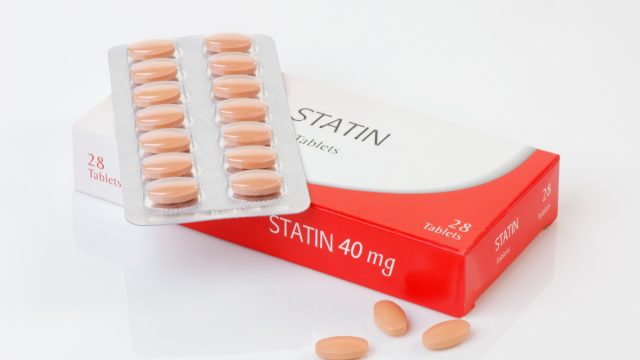Common Statin Spikes Diabetes Risk, New Study Finds

High cholesterol is very common, affecting 71 million Americans, according to Johns Hopkins Medicine. Certain lifestyle changes can help control “bad” cholesterol levels, including exercise and a healthy diet, but medication is also an option. Statins are some of the most commonly prescribed meds, working to block a substance that your liver needs to make cholesterol, and prompting your liver to remove cholesterol from your blood, according to the Mayo Clinic. There are different kinds of statins, but a recent study found that one very common type could have an unintended consequence. Read on to find out more about the link between a popular statin and diabetes.
RELATED: Ozempic Patient Reveals “Excruciating” New Side Effect.
The study compared rosuvastatin and atorvastatin.

A study published in BMJ last month investigated two widely used statins, rosuvastatin (commonly branded as Crestor) and atorvastatin (commonly branded as Lipitor), to determine their long-term effectiveness and safety in adults with coronary artery disease (CAD).
According to a press release outlining the findings, lowering “bad” cholesterol (low-density lipoprotein, or LDL) levels is recommended for those with CAD, but very few studies have compared these two statins—described as “the two most potent”—among these patients.
The study was completed between Sept. 2016 and Nov. 2019, with researchers analyzing data from 4,400 patients at 12 hospitals in South Korea.
Patients were randomly assigned to take either rosuvastatin or atorvastatin over the three-year period, with investigators then looking at differences in number of deaths (from any cause), rates of heart attacks, strokes, and coronary revascularization (procedures that restore blood flow to the heart), the press release states. Researchers also looked at hospital admissions due to heart failure, major blood clots, cataract surgery, as well as development of type 2 diabetes.
RELATED: Heart Medication Recalled After Dangerous Label Mix-Up, FDA Warns.
Patients on rosuvastatin had a higher risk of diabetes and cataract surgery.

Nearly 88 percent of patients finished the trial, with no differences observed between rosuvastatin and atorvastatin in terms of death, heart attack, stroke, and revascularization.
Those on rosuvastatin had lower average LDL cholesterol levels during the study when compared with those on atorvastatin, but they also had a higher risk of needing cataract surgery (2.5 percent vs. 1.5 percent)—and developing diabetes.
According to the press release, 7.2 percent of patients in the rosuvastatin group developed diabetes, compared to 5.3 percent of the atorvastatin group. The study also found that those taking rosuvastatin also had a higher risk of developing diabetes that required antidiabetic medication (7.2 percent vs. 5.3 percent).
RELATED: New Drug Has People Losing 60 Pounds on Average, Research Shows—And It’s Not Ozempic.
This wasn’t the first study to link rosuvastatin and diabetes.

Study authors noted that the 2008 JUPITER trial was the first to report an increased risk of diabetes in people taking rosuvastatin; however, the 2023 study was the first to look at diabetes incidence in patients taking rosuvastatin versus atorvastatin.
Researchers also noted that more research is needed to determine whether the increase in diabetes and cataract surgery is “directly related to the statin treatment.”
There were limitations.

The study authors did note some limitations, including a limited patient pool, which may have affected results.
“The researchers acknowledge several study limitations including the fact that only Asian participants were included in this trial, and the three-year study period may have been relatively short to find longer term effects of two statin types,” the press release reads.
With that in mind, they warn that findings “should be interpreted with caution, and further dedicated investigation with longer follow-up is warranted.”
RELATED: For more up-to-date information, sign up for our daily newsletter.
Best Life offers the most up-to-date information from top experts, new research, and health agencies, but our content is not meant to be a substitute for professional guidance. When it comes to the medication you’re taking or any other health questions you have, always consult your healthcare provider directly.
- Source: https://www.hopkinsmedicine.org/health/wellness-and-prevention/cholesterol-5-truths-to-know
- Source: https://www.mayoclinic.org/diseases-conditions/high-blood-cholesterol/diagnosis-treatment/drc-20350806
- Source: https://www.bmj.com/content/383/bmj-2023-075837
- Source: https://pubmed.ncbi.nlm.nih.gov/18997196/